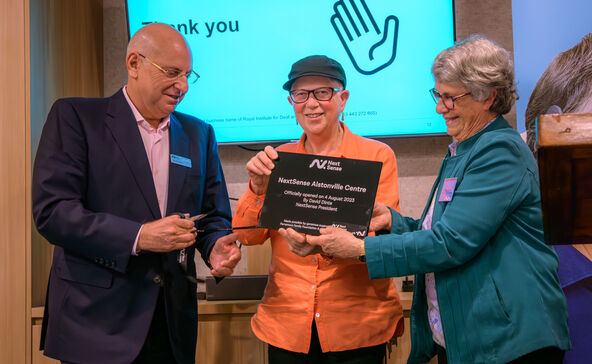- Hearing
The NextSense Alstonville centre was officially opened today (Friday), replacing the not-for-profit organisation’s Lismore centre, which was destroyed in the 2022 floods.
NextSense has serviced the town and surrounding areas for more than 20 years and its Alstonville centre is the Northern Rivers region’s sole cochlear implant and early intervention facility for children and adults with hearing loss.
“The impacts of last year’s flood disaster are far-reaching and continue to reverberate, with many stories of suffering in the region,” said NextSense Chief Executive Chris Rehn.
“While the loss of our Lismore centre was a huge blow, our story is also one of community and resilience. The NextSense team is privileged to have found a new home so quickly and to be staying as part of the fabric of this great community. Our local staff will continue to work as a team to create a program of care unique to each client.
"Access to our services for more than two decades, including in Lismore and now in Alstonville, has ensured quality hearing care for people in the region, contributing to improvements in people’s health, communication and social wellbeing. Loss of hearing is one of the most prevalent disabilities in Australia, with about 3.6 million Australians living with hearing loss. By 2060 that’s expected to double to more than 7.8 million people, so we need to continue our commitment to getting people the services they need.”
The re-opening has also brought a new benefit to the region: easier access to wrap-around hearing healthcare through a partnership with leading ear surgeon Dr Joshua Jervis-Bardy, who now shares premises with NextSense at Alstonville.
The new centre is situated close to both Lismore Base Hospital and St Vincent’s Lismore, servicing clients through the public and private healthcare systems. Services include early intervention in children, pre-surgery assessment and post-surgery rehabilitation in children and adults.
Dr Jervis-Bardy, an ear, nose and throat (ENT) surgeon who has a special interest in complex ear surgeries and also conducts outreach work focused on better management of otitis media in Indigenous children, said that access to regional health facilities such as the Alstonville centre brought many benefits.
“While treatment options are available, people often wait 10 years or more before they reach out for help with their hearing loss. Hearing loss can be linked with social isolation and loneliness, anxiety and depression and is the biggest modifiable risk for dementia in middle age,” he said.
“It is therefore critical that everyone has access to quality hearing services, including audiology, outpatient ENT services and access to ENT surgery.”
Mr Rehn said the doors are open thanks to the generous efforts of many.
“This would not have been possible without the support of our generous donors, including the Parramore Family and JLDJS Foundation, and the NextSense Board. Support from our partners was also critical. Hearing Australia, for example, provided us with office space to keep some services running as we found a new home.”








